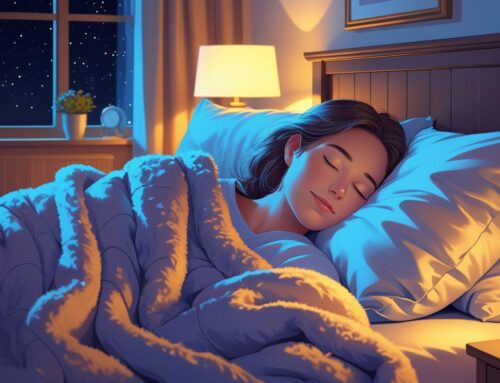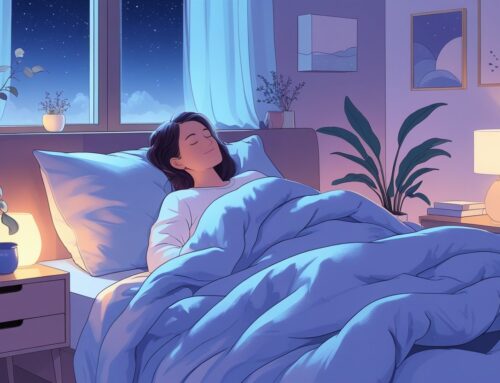When the thyroid gland slows down and doesn’t make enough hormones, the whole body feels it. This condition, called hypothyroidism, can affect everything from energy to body temperature. Sleep is one of the areas where people notice changes the most. Many struggle to fall asleep, wake up in the middle of the night, or never feel fully rested. The thyroid itself isn’t causing insomnia, but the problems it creates often spill over into sleep.
Low hormone levels can leave someone feeling tired during the day yet restless at night. On top of that, muscle aches, stiffness, or being overly sensitive to cold can make it harder to stay comfortable in bed. The thyroid’s role in regulating metabolism and energy means that when it’s not working right, sleep patterns get thrown off too. Recognizing this connection can make it easier to look for the right treatment and better habits to improve rest.
Some people with hypothyroidism also deal with other sleep disorders, which adds another layer of exhaustion. The good news is that symptoms can be managed. Medication, lifestyle adjustments, and even small changes to a sleep setup can help. Something as simple as finding a mattress that supports the body, eases pressure, and stays cool may bring more comfort at night and better mornings afterward.
Key Takeaways
- An underactive thyroid can disturb sleep through low energy and physical discomfort.
- People often have trouble falling asleep or staying asleep with hypothyroidism.
- Managing symptoms and building healthy routines can support better sleep.
- Choosing a mattress with proper support, pressure relief, and cooling features can significantly improve sleep quality for people with hypothyroidism by addressing their unique comfort and temperature needs.
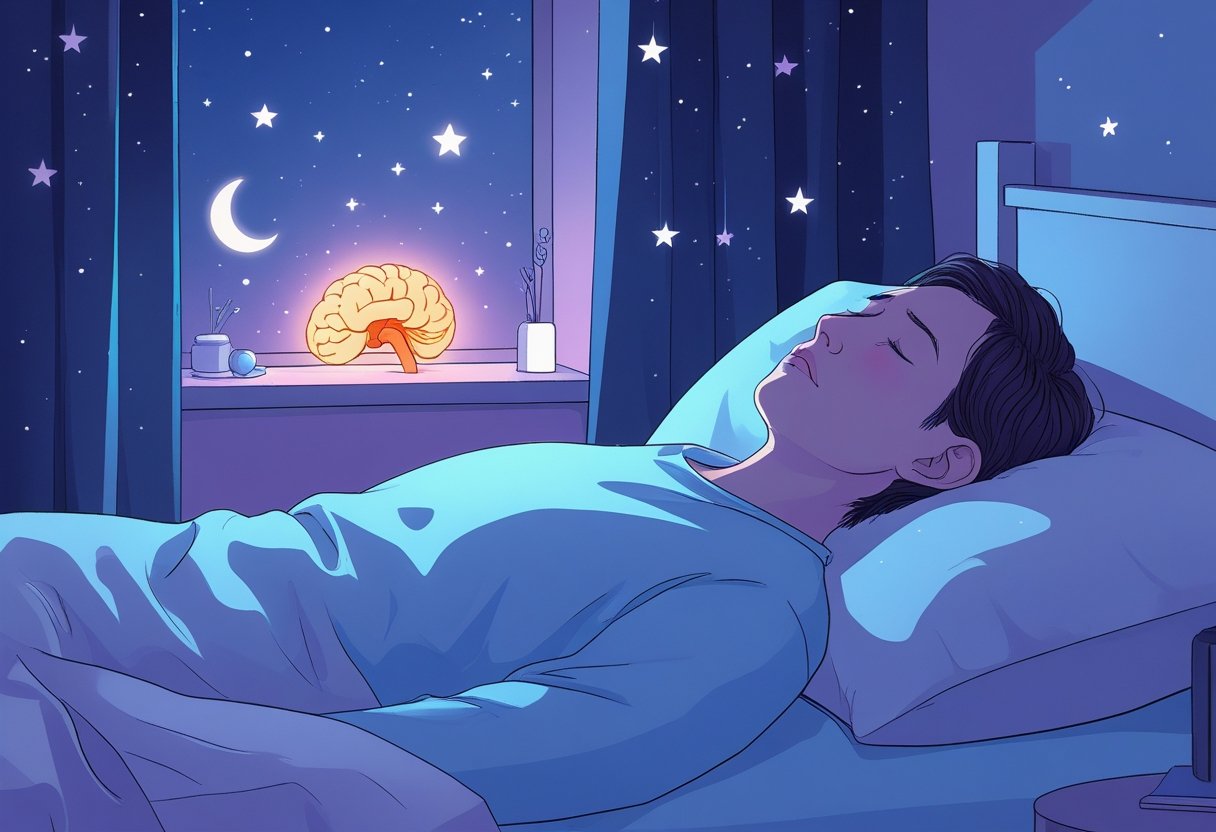
How the Thyroid Influences Sleep
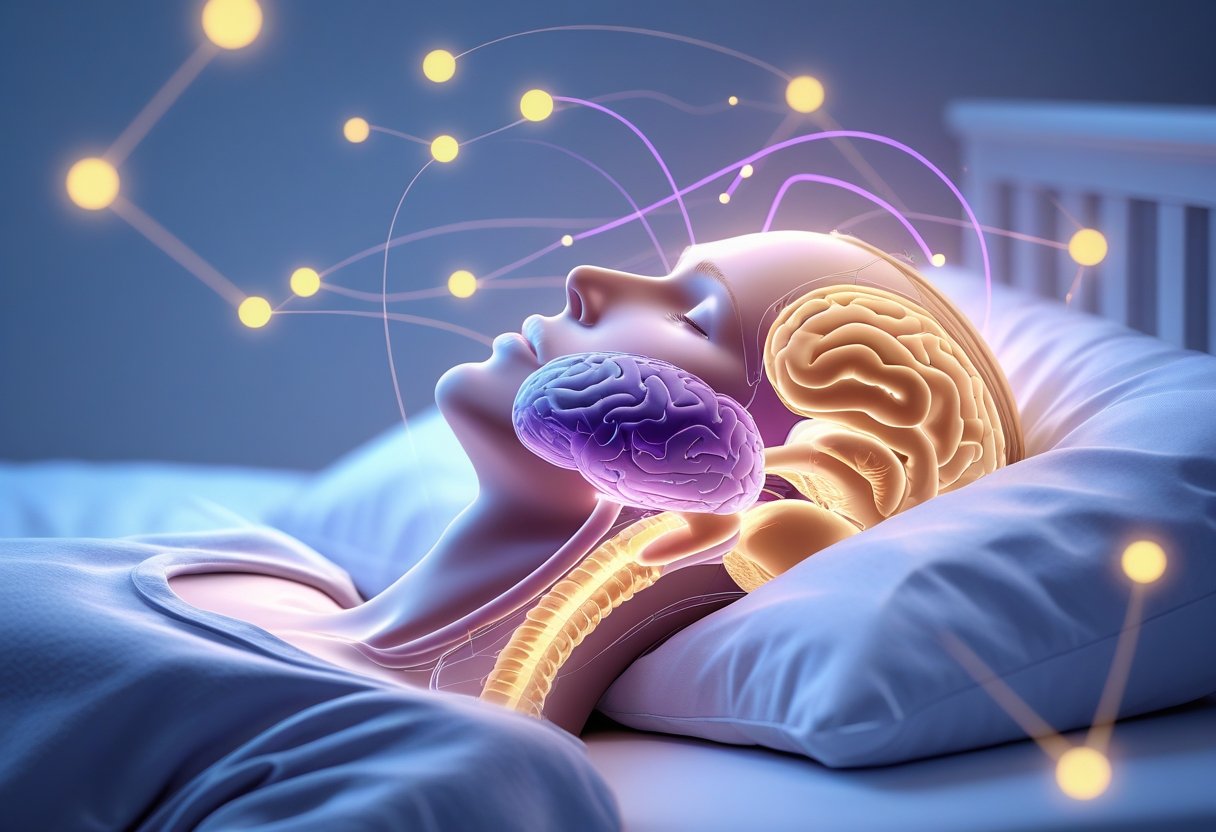
The thyroid gland produces hormones that affect body functions such as metabolism, energy levels, and mood. When thyroid hormone levels rise too high or fall too low, sleep patterns can be disrupted in different ways. A clearer understanding of this connection explains why thyroid problems come with sleep issues.
Thyroid Hormones and Sleep Regulation
Thyroid hormones, mainly T3 and T4, control metabolism and influence other hormones like cortisol and melatonin. These hormones play key roles in regulating the sleep–wake cycle.
Low thyroid hormone levels, as seen in hypothyroidism, reduce melatonin production and lead to difficulty falling or staying asleep. High hormone levels, as seen in hyperthyroidism, overstimulate the nervous system and make it harder to relax at night. Balanced thyroid hormone activity supports normal sleep patterns by working with brain centers that regulate sleep.
Can Thyroid Cause Sleep Problems?
Thyroid conditions often lead to sleep issues such as insomnia, restless legs syndrome, and sleep apnea. People with hypothyroidism may feel exhausted during the day but still struggle with insomnia at night. Fatigue and mental fog worsen when sleep quality declines. Hyperthyroidism heightens nervous system activity, causing difficulty initiating sleep and frequent nighttime awakenings.
Thyroid dysfunction disrupts hormone balance and can trigger or worsen existing sleep disorders. Treating thyroid conditions often improves overall sleep quality.
How Does Thyroid Affect Sleep?
The thyroid influences sleep through hormone levels, metabolism, and nervous system activity.
- Hypothyroidism slows metabolism and reduces energy, leading to daytime sleepiness but poor nighttime sleep.
- It also weakens airway muscle tone, which raises the risk of obstructive sleep apnea.
- Hyperthyroidism speeds up metabolism and stimulates the nervous system, which makes it harder to fall asleep. Night sweats and restlessness commonly occur.
Both conditions interfere with normal REM and deep sleep cycles, lowering overall sleep quality. Addressing thyroid problems is essential to restore healthier sleep rhythms.
The Link Between Hypothyroidism and Sleep Disturbances
Hypothyroidism affects the body’s metabolism and hormone balance, and this condition disrupts normal sleep patterns in several ways. These disruptions may include difficulty falling asleep, unexpected sweating at night, or unusually long periods of rest. A closer look at these effects shows how thyroid function directly influences overall sleep quality.
Common Sleep Issues in Hypothyroidism
People with hypothyroidism often face trouble falling or staying asleep because reduced thyroid hormone levels interfere with the circadian rhythm that regulates the sleep–wake cycle. Sleep can feel lighter, shorter, or less restorative than usual. Fatigue linked to hypothyroidism often feels intense even after hours of rest.
Other frequent issues include longer sleep latency, taking more time to fall asleep, and repeated awakenings throughout the night. Conditions such as sleep apnea and restless leg syndrome, which are sometimes associated with hypothyroidism, further affect sleep quality. Combined, these problems reduce overall restfulness and lead to significant daytime fatigue.
Hypothyroidism and Night Sweats
Night sweats, or excessive sweating during sleep, may appear in some people with hypothyroidism, though this symptom is less common compared to other thyroid conditions. Shifts in thyroid hormone levels can disturb temperature regulation, which triggers sudden episodes of sweating or hot flashes overnight.
This symptom often breaks up sleep and adds to discomfort. In some cases, night sweats may stem from anxiety or other hormonal imbalances that occur with hypothyroidism. Keeping thyroid hormone levels in check often lessens this issue.
Excessive Sleepiness and Sleeping a Lot
Hypothyroidism can also lead to marked daytime sleepiness and extended sleeping hours. Slowed metabolism and reduced energy production make individuals rest longer than usual while still feeling drained and sluggish. This type of sleepiness goes beyond ordinary tiredness because it lingers and rarely improves after rest. It can affect focus, productivity, and daily routines.
Proper treatment with thyroid hormone replacement often restores energy and reduces the need for excessive sleep.
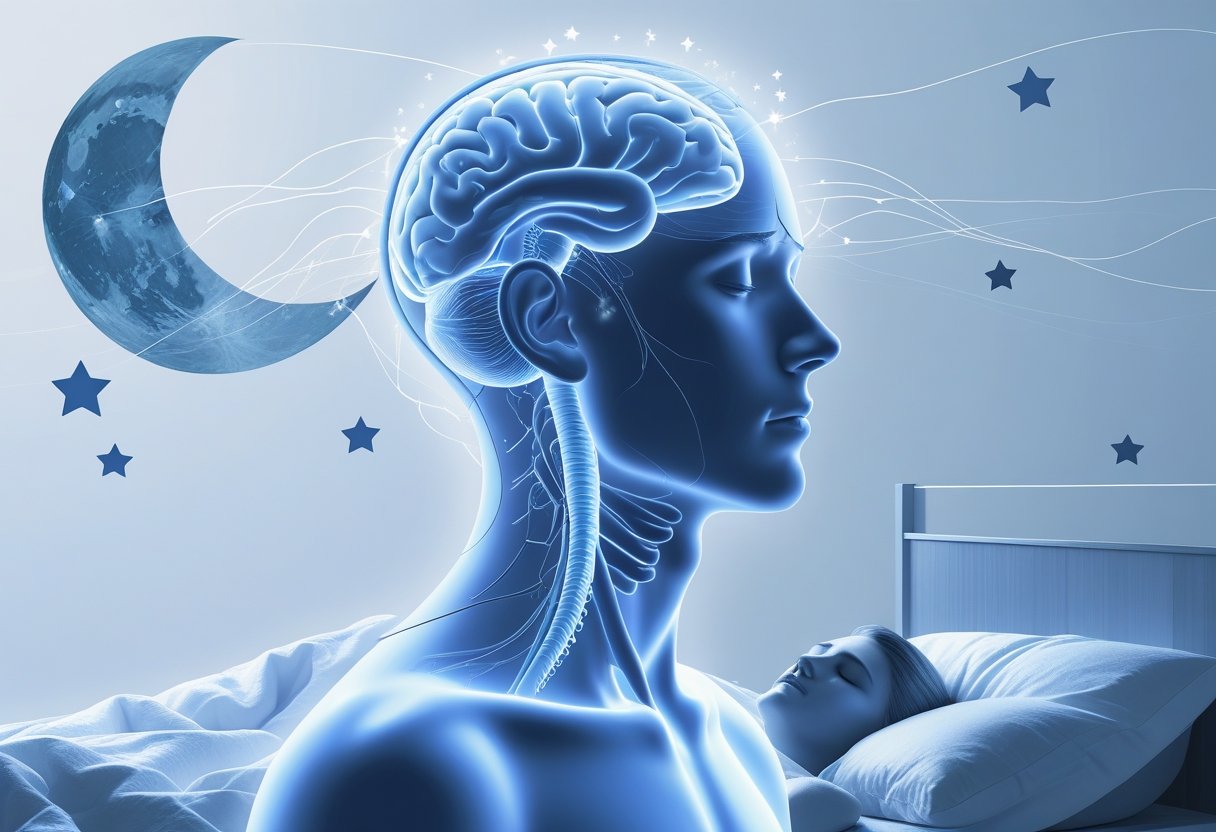
Sleep Disorders Associated With Thyroid Dysfunction
Thyroid issues can mess with sleep in different ways. Some people can’t fall asleep easily, others wake up because of leg discomfort, and some struggle with breathing at night. The type of problem often depends on whether the thyroid is overactive or underactive, so the experience isn’t the same for everyone.
Insomnia and Thyroid Disorders
Insomnia shows up a lot in people dealing with thyroid conditions. With hyperthyroidism, the body runs on overdrive. Higher hormone levels push metabolism and anxiety up, and that makes it hard to relax at night. Falling asleep takes longer, and waking up in the middle of the night happens more often. People with Graves’ disease, for example, often mention nights full of restlessness.
For hypothyroidism, the reasons are different. Muscle pain, feeling too cold, or even anxiety can make it tough to stay comfortable in bed. Some studies note that people with low thyroid hormones take longer to fall asleep and feel less satisfied with their rest. The connection isn’t as direct as it is with hyperthyroidism, but keeping hormones balanced usually makes a difference.
Restless Legs Syndrome and Nocturnal Symptoms
Restless Legs Syndrome (RLS) is another sleep problem linked to thyroid changes. It creates unpleasant sensations in the legs, especially when trying to rest, and that makes sleep harder to get. Both high and low thyroid hormone levels can make these feelings worse. People often describe cramps, twitching, or movements they can’t control, which interrupt their sleep cycle.
Treating thyroid imbalances has been shown to calm RLS in many cases, pointing to how important hormone balance is for nighttime comfort.
Obstructive Sleep Apnea in Hypothyroidism
Some people with hypothyroidism also deal with obstructive sleep apnea (OSA). A larger thyroid gland or weaker airway muscles can block airflow, leading to pauses in breathing while asleep.
Hypothyroidism doesn’t directly cause OSA, but it can add to the problem. For some, thyroid treatment lowers the number of apnea episodes, but for others it doesn’t change much. That shows OSA often has several causes. Still, staying on the right thyroid treatment supports overall health and may improve breathing during sleep.

Hyperthyroidism and Night-Time Symptoms
Hyperthyroidism causes changes in the body that become more noticeable during the night. People with this condition may face intense sweating, difficulty sleeping, and stronger symptoms in the evening. These problems stem from the way excess thyroid hormone affects metabolism and the nervous system.
Night Sweats in Hyperthyroidism
Night sweats are common among people with hyperthyroidism because an overactive metabolism increases heat production. Excess thyroid hormone raises internal body temperature, which triggers heavy sweating at night. This can leave clothes and bedding soaked and disrupt restful sleep.
Night sweats tied to hyperthyroidism differ from ordinary sweating since they happen regardless of the room temperature. Managing them usually involves addressing the thyroid condition itself. Cooling the bedroom and wearing lighter clothing may help, yet these steps do not resolve the underlying issue. Anyone with persistent night sweats should speak with a healthcare professional.
Why Is Hyperthyroidism Worse at Night?
Hyperthyroidism feels worse at night because the body’s natural rhythms interact with elevated hormone levels. The nervous system stays more active in those with hyperthyroidism, so symptoms such as a rapid heartbeat, anxiety, and overheating intensify after dark. This heightened state makes it harder to relax and fall asleep. Hormonal fluctuations also interfere with normal temperature control, creating a cycle where symptoms flare while trying to rest. Recognizing this pattern makes it easier to find strategies that improve nighttime comfort.
Hyperthyroidism and Sleep Quality
Sleep quality often declines in people with hyperthyroidism. Anxiety, a racing heart, and night sweats break up sleep and make it harder to stay asleep. These interruptions lead to poor rest and daytime fatigue. An overactive thyroid stimulates the nervous system, which makes winding down at night more difficult. Many people feel drained during the day because of these disrupted nights.
Treating hyperthyroidism usually improves sleep by easing symptoms, and practical bedtime adjustments further support better rest.
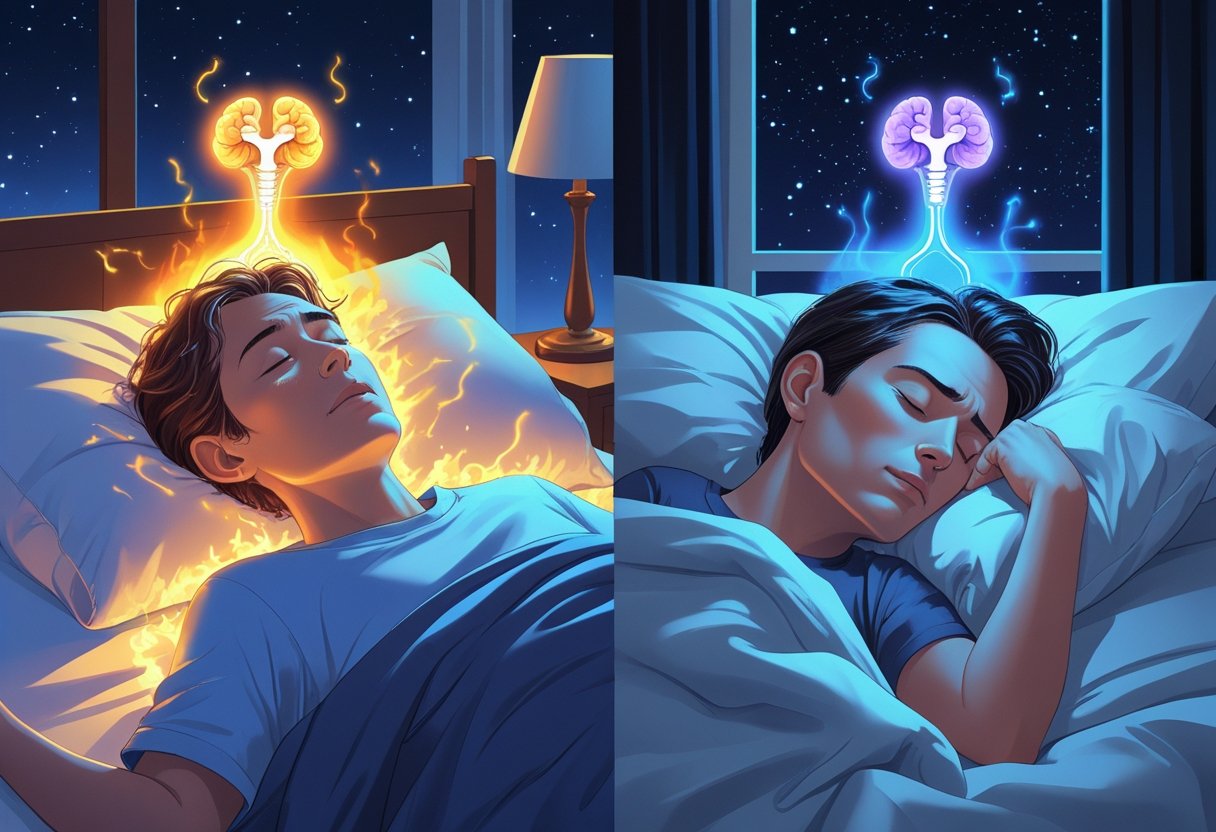
Underlying Mechanisms Connecting Thyroid and Sleep
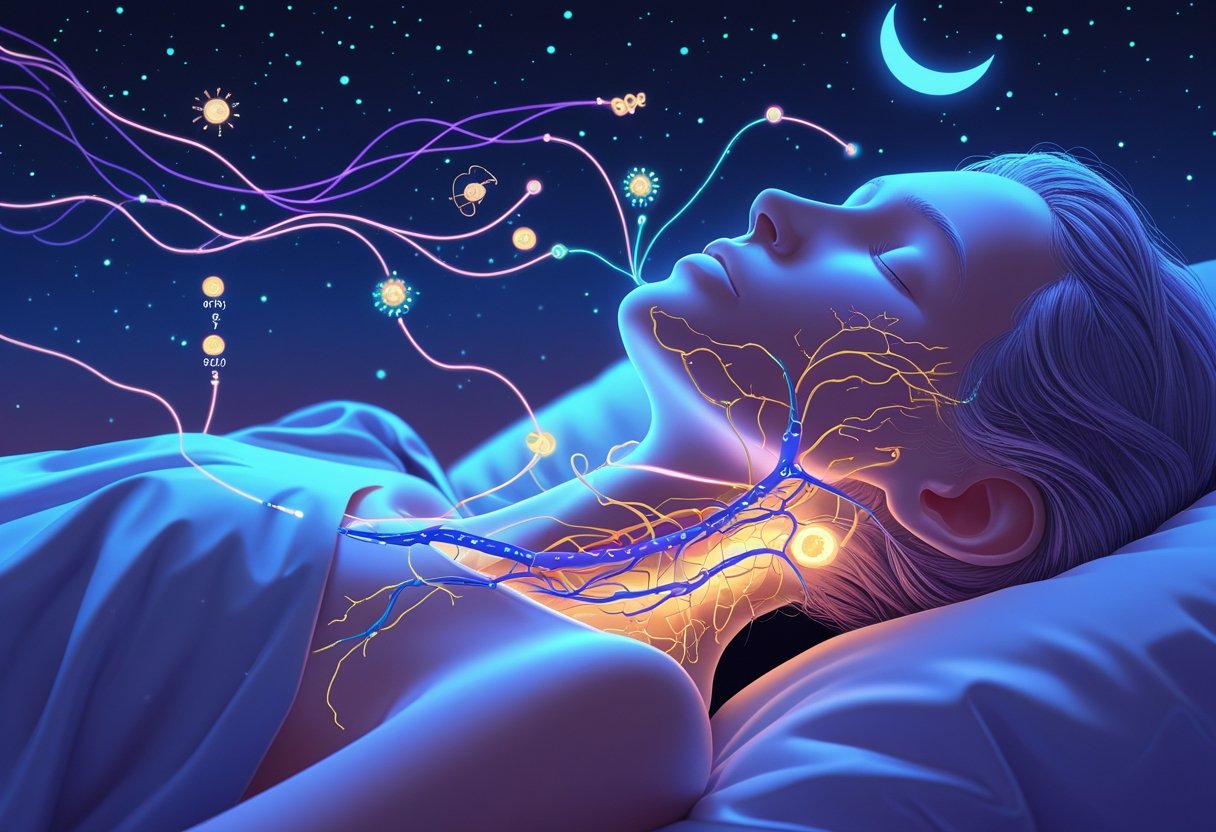
Thyroid hormones affect several body systems that regulate sleep and wakefulness. Changes in thyroid function alter metabolism, hormone levels, and brain activity, and these shifts influence sleep quality. The link between thyroid issues and sleep is complex and involves feedback loops.
Hormonal and Metabolic Pathways
Thyroid hormones control the body’s metabolism, influencing energy use and temperature, which are both important for sleep regulation. Low thyroid hormone levels in hypothyroidism slow metabolism and reduce the body’s ability to maintain normal sleep cycles.
The hypothalamic‑pituitary‑thyroid (HPT) axis plays a critical role. It controls the release of thyroid‑stimulating hormone (TSH) and thyroid hormones, following a circadian rhythm that ties directly to sleep patterns. Shifts in thyroid hormone levels disrupt this rhythm and lead to poor sleep quality or insomnia.
Imbalances in thyroid hormones also affect the body’s stress response and neurotransmitter systems, which makes it harder to fall asleep and stay asleep.
Bidirectional Relationship Between Conditions
Hypothyroidism and sleep problems influence each other. Poor sleep raises stress hormones, which interfere with the HPT axis and make thyroid function worse. This creates a cycle where thyroid dysfunction causes insomnia, and insomnia intensifies thyroid problems.
Stress and sleep loss increase inflammation and change hormone levels, which further weaken thyroid performance. Treating thyroid problems improves sleep, while better sleep can support healthier thyroid function. This interaction shows why healthcare providers should consider both thyroid and sleep when diagnosing and treating patients. Understanding this relationship helps guide better management strategies for those affected by hypothyroidism and sleep disturbances.
Management Strategies for Better Sleep With Thyroid Disorders
Managing sleep issues with hypothyroidism means keeping thyroid levels steady, building healthier habits, and knowing when to seek medical help. Sleep problems tied to thyroid imbalance can be frustrating, but a mix of treatment and daily changes usually helps.
Optimizing Thyroid Treatment
Getting the right thyroid treatment is often the first step to better sleep. Many people take levothyroxine to replace low thyroid hormones. It works best when taken the same way every day, usually in the morning before eating. This helps keep hormone levels stable.
Doctors monitor thyroid-stimulating hormone (TSH) to check if the dose is correct. Too little hormone often leaves you tired and sluggish, while too much can cause restlessness or make it hard to fall asleep. If sleep problems don’t improve, the doctor may adjust the dose or look for other causes, such as sleep apnea or restless legs, which are common with thyroid issues.
Sleep Hygiene and Lifestyle Adjustments
Good sleep habits can ease the impact of hypothyroidism. Going to bed and waking up at the same time each day helps regulate your body’s rhythm. Limiting screen time before bed prevents light from disturbing your sleep cycle. Avoiding caffeine and nicotine later in the day also helps. Your bedroom should be quiet, dark, and cool for the best rest. Staying active during the day supports deeper sleep, but exercise too close to bedtime can make it harder to wind down. Stress relief practices like meditation or breathing exercises may also reduce anxiety that interferes with rest.
When to See a Doctor
It’s a good idea to see a doctor if sleep problems continue despite proper treatment and better routines. Ongoing fatigue, frequent waking at night, or difficulty falling asleep may point to another sleep disorder or an imbalance in thyroid levels.
A doctor may suggest further tests, including a sleep study, to check for problems like obstructive sleep apnea. Adjusting thyroid medication or treating related conditions often improves sleep. Getting timely medical help ensures that both hypothyroidism and sleep issues are managed, making daily life easier and improving overall well-being.
How the Right Mattress Supports Better Sleep for People with Hypothyroidism
People living with hypothyroidism often deal with restless nights. Waking up several times or feeling uncomfortable in bed can be common. A supportive mattress can make a real difference because it helps the body stay comfortable and supported through the night. The best mattresses are the ones that keep the spine straight and reduce pressure on the body. This lowers the chances of waking up sore or stiff. A medium-firm mattress is usually a safe pick since it gives solid support but still feels cushioned enough to rest on.
Temperature also matters. Many with hypothyroidism feel colder than usual, so a mattress made with breathable materials can help. Natural latex and gel memory foam are good examples, as they prevent heat buildup but still keep the bed cozy without getting too hot or too cold.
Essential mattress qualities for improved hypothyroidism sleep:
- Pressure relief to ease joint and muscle pain
- Support that keeps the spine in a healthy position
- Cooling features to avoid temperature swings at night
- Durability so comfort lasts for years
Some people also find relief using adjustable beds. Being able to raise or lower parts of the bed can reduce pressure on painful areas and may also help with breathing issues like sleep apnea, which can sometimes come with hypothyroidism.
One option to look at is the Bear Pro Hybrid Mattress. It combines gel-infused memory foam with supportive coils to create a medium-firm feel (around 7/10). This setup helps with pressure relief while also keeping airflow steady, which testers have found useful for staying cool. Beyond comfort, this mattress is built to last. Its edges stay strong over time, which keeps the shape from sagging and provides steady support across the surface. For people with hypothyroidism, the mix of cooling, support, and long-term stability makes it a dependable choice for better sleep.

Frequently Asked Questions
Hypothyroidism can lead to a range of sleep issues. These include changes in how long and how well a person sleeps, shifts in how the body responds to rest, and related conditions that may appear over time. Understanding these effects helps manage both thyroid health and overall sleep quality.



